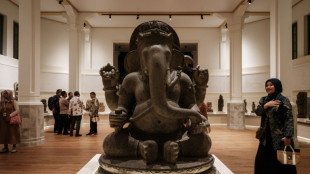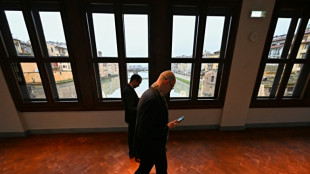
-
 Ski great Vonn finishes 14th on World Cup return
Ski great Vonn finishes 14th on World Cup return
-
Scholz visits site of deadly Christmas market attack

-
 Heavyweight foes Usyk, Fury set for titanic rematch
Heavyweight foes Usyk, Fury set for titanic rematch
-
Drone attack hits Russian city 1,000km from Ukraine frontier

-
 Former England winger Eastham dies aged 88
Former England winger Eastham dies aged 88
-
Pakistan Taliban claim raid killing 16 soldiers

-
 Pakistan military courts convict 25 of pro-Khan unrest
Pakistan military courts convict 25 of pro-Khan unrest
-
US Congress passes bill to avert shutdown

-
 Sierra Leone student tackles toxic air pollution
Sierra Leone student tackles toxic air pollution
-
German leader to visit site of deadly Christmas market attack

-
 16 injured after Israel hit by Yemen-launched 'projectile'
16 injured after Israel hit by Yemen-launched 'projectile'
-
Google counters bid by US to force sale of Chrome

-
 Russia says Kursk strike kills 5 after Moscow claims deadly Kyiv attack
Russia says Kursk strike kills 5 after Moscow claims deadly Kyiv attack
-
Cavaliers cruise past Bucks, Embiid shines in Sixers win

-
 US President Biden authorizes $571 million in military aid to Taiwan
US President Biden authorizes $571 million in military aid to Taiwan
-
Arahmaiani: the Indonesian artist with a thousand lives

-
 Indonesians embrace return of plundered treasure from the Dutch
Indonesians embrace return of plundered treasure from the Dutch
-
Qualcomm scores key win in licensing dispute with Arm

-
 Scientists observe 'negative time' in quantum experiments
Scientists observe 'negative time' in quantum experiments
-
US approves first drug treatment for sleep apnea

-
 US drops bounty for Syria's new leader after Damascus meeting
US drops bounty for Syria's new leader after Damascus meeting
-
Saudi man arrested after deadly car attack on German Christmas market

-
 'Torn from my side': horror of German Christmas market attack
'Torn from my side': horror of German Christmas market attack
-
Bayern Munich rout Leipzig on sombre night in Germany

-
 Tiger in family golf event but has 'long way' before PGA return
Tiger in family golf event but has 'long way' before PGA return
-
Pogba wants to 'turn page' after brother sentenced in extortion case

-
 Court rules against El Salvador in controversial abortion case
Court rules against El Salvador in controversial abortion case
-
French court hands down heavy sentences in teacher beheading trial

-
 Israel army says troops shot Syrian protester in leg
Israel army says troops shot Syrian protester in leg
-
Tien sets-up all-American NextGen semi-final duel

-
 Bulked-up Fury promises 'war' in Usyk rematch
Bulked-up Fury promises 'war' in Usyk rematch
-
Major reshuffle as Trudeau faces party pressure, Trump taunts

-
 Reggaeton star Daddy Yankee in court, says wife embezzled $100 mn
Reggaeton star Daddy Yankee in court, says wife embezzled $100 mn
-
Injured Eze out of Palace's clash with Arsenal

-
 Norway's Deila named coach of MLS Atlanta United
Norway's Deila named coach of MLS Atlanta United
-
Inter-American Court rules Colombia drilling violated native rights

-
 Amazon expects no disruptions as US strike goes into 2nd day
Amazon expects no disruptions as US strike goes into 2nd day
-
Man Utd 'more in control' under Amorim says Iraola

-
 Emery insists Guardiola 'still the best' despite Man City slump
Emery insists Guardiola 'still the best' despite Man City slump
-
US confirms billions in chips funds to Samsung, Texas Instruments

-
 English Rugby Football Union chairman quits amid pay row
English Rugby Football Union chairman quits amid pay row
-
Major reshuffle as Trudeau faces party pressure, Trump attacks

-
 Gatland remains as Wales boss but must 'change fortunes on the pitch'
Gatland remains as Wales boss but must 'change fortunes on the pitch'
-
Argentina's dollar craze cools under greenback-loving Milei

-
 Medici secret passageway in Florence reopens after refit
Medici secret passageway in Florence reopens after refit
-
Anger after Musk backs German far right

-
 Arteta says 'best is yet to come' as he marks five years at Arsenal
Arteta says 'best is yet to come' as he marks five years at Arsenal
-
Pereira happy to achieve Premier League 'target' with Wolves

-
 'Dark lull' in German energy transition sparks political debate
'Dark lull' in German energy transition sparks political debate
-
Russian skaters allowed to compete as neutrals in 2026 Winter Olympics


Twice displaced: Syrian refugees flee home from Lebanon
A decade after finding refuge in Lebanon from civil war in his native Syria, Ahmad Mustafa fled in the other direction this week from a new conflict between Israel and Hezbollah.
"We're starting from scratch all over again," the 46-year-old said after crossing the border into Syria with his wife and three children.
Mustafa recounted escaping his hometown of Raqa in northern Syria after Islamic State group jihadists overran the city in 2013.
"We fled with just the clothes on our back," he said.
"Now it's the same in Lebanon. We had to run for our lives under the bombs," he said of his family's escape from their home in the south Lebanon village of Wazzani under Israeli bombardment.
He and his family were heading back to Raqa, hoping to stay with relatives once they got there.
Lebanon became home to hundreds of thousands of Syrians after the repression of anti-government protests in Syria in 2011 sparked a war that has since killed more than half a million people.
But intensifying Israeli strikes on Lebanon since September 23 have prompted 310,000 people to flee to Syria, most of them Syrian refugees, according to the Lebanese authorities.
By comparison, the 2006 war between Israel and Hezbollah prompted around 250,000 people to flee from Lebanon to Syria in 33 days of war.
- 'Never-ending plight' -
Syrian refugee Jaafar al-Ali, 53, was another of those returning home through the border crossing near the Syrian town of Al-Qusayr.
He and his family fled Raqa in 2014, the year it became the de facto capital of the caliphate IS proclaimed after seizing large parts of Syria and neighbouring Iraq.
With US support, Kurdish-led forces slowly pushed IS out of Raqa and other cities, dealing a final blow to the IS caliphate in 2019.
Now Ali, his wife and three children have also been forced to flee Wazzani.
Israel says it is targeting Hezbollah in its strikes in Lebanon, but officials say many civilians have also been killed.
Lebanese authorities say 1.2 million people have fled their homes.
"It's a never-ending plight from one displacement to the next," Ali said, waiting for a bus to take him back to a hometown where he no longer has a home.
"Today we're heading to spend the night in the street in Raqa," he said.
"I have nothing left there -- no family, no relatives, no home."
At the border, he had made a small makeshift room for himself and his family from cardboard boxes that had been used to distribute food aid.
Ali glanced sadly at his 13-year-old son Muayad as he brought his siblings water.
"He's only known war and displacement," he said.
"He hasn't received an education and he can't read or write -- just like his other siblings."
- 'Death was stalking me' -
Dozens of Syrians have been killed in Lebanon in the recent escalation, according to the United Nations.
More than 774,000 Syrian refugees were registered with the United Nations in Lebanon before the latest escalation, though the tiny country said that it hosted some two million of them -- the world's highest ratio of refugees per capita.
Many Lebanese believe the Syrian refugees are a burden and a strain on an already desperately struggling economy.
In recent years, fighting in Syria has reduced in intensity but it too is gripped by a deep economic crisis.
Bashar Hamaydi, 25, says he paid a fortune to escape Raqa in 2016 and seek a more promising life abroad.
But war caught up with him in Wazzani too.
"We heard the sounds of bombardment, and we saw bodies by the roadside as we fled by bus to Beirut."
The home that he, his wife and three children lived in was destroyed, and several neighbours died in Israeli strikes, he said.
"I felt like death was stalking me. I turned around to see if it had come for me or a family member," he said.
"I'll never forget how my children screamed. It was a day of terror that I will never forget as long as I live."
Nogueira--PC
